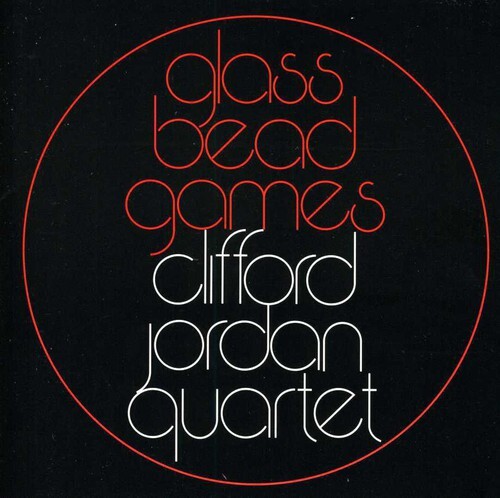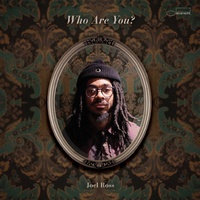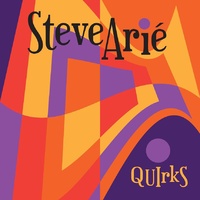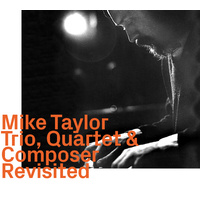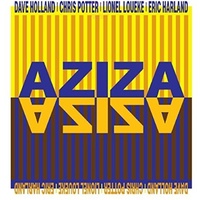2 albums on one CD
Clifford Jordan's two volumes of sessions under the title Glass Bead Games have long been heralded as some of the most important work of his career. These once rare recordings, previously issued as individual albums and as a two-LP set by Strata East, feature the late tenor saxophonist leading two separate quartets. The first, with pianist Stanley Cowell, bassist Bill Lee and drummer Billy Higgins, consists of seven powerful originals by the band. The portraits include Jordan's well-named "Powerful Paul Robeson" and Cowell's driving post-bop tribute "Cal Massey." But it is Lee's moving "John Coltrane" which opens with a solo chorus by its composer and includes a vocal chant by Jordan, Higgins and Lee, that leaves the most lasting impression, with influences from throughout several of Coltrane's landmark recordings made during the '60s. Lee's "Biskit," which follows his piece "Eddie Harris," sounds as if Harris himself could have written it.
The second quartet has Cedar Walton taking over on piano and Sam Jones on bass. This session is not quite as adventurous but is every bit as enjoyable, with stimulating compositions by Walton, Cowell, Higgins and Jones. Jordan devours his drummer's "Alias Buster Henry" whole with his far-reaching solo. Jones' blues "One for Amos" was the only established piece recorded for the album, having received wide exposure during the previous decade; this updated arrangement ranks among its finest interpretations. Long out of print and fetching high prices at auctions, this Harvest Song reissue, which combines all issued tracks on one disc, returns a legendary release to print at a much more affordable price. Highly recommended.
AllMusic Review by Ken Dryden
Glass Bead Games is arguably the crown jewel of the Strata East movement, an amorphous genre that treads an unusual path between post-bop, 70’s avant-garde and spiritual jazz, with a groove.
Glass Bead Games is full of revelations at many levels. First, the decade of the 1970s did produce genuinely creative, "human" new music flowing from the jazz mainstream; second, Bill Lee was more than Spike's dad: he was a superlative bassist, a team player of the first order, a powerful catalyst who, if anything, deserves to be better known than his son; third, Billy Higgins was, as so many musicians insist, a once-in-a-lifetime drummer—the bellows inspiriting the collective flame.
Most importantly, Clifford Jordan was an artist of the first order, his playing so effortless and unforced, unselfconscious and focused, mature and wise that, at a time when altissimo fury was all the rage, it's small wonder his authentic voice frequently went unheard. His musical rhetoric is so personally expressive, its substance so compelling, the listener couldn't care less about the extraordinary technique required to convey its captivating message. Compared to some of his more acclaimed peers he's a less aggressive yet paradoxically more directive and shaping influence. The climaxes, rather than spelled out, are merely suggested, registering with deep and lasting impact on the listener. It all comes down to learning the language, those precious little beads. Not every player, including Jordan or the listener, can use it like Shakespeare, but all can learn to read Shakespeare and understand its principles of arbitrariness and serendipity, of invariance and transformation.
Jordan, no less than Shakespeare, requires a like-minded cast of players—in this case four musicians of such redoubtable proficiency that each remains committed to keeping the beads in play. He's not a man content with a mere musical "dialogue" with his fellow musicians nor is he about to take the initiative in pulling his troops up to his level. Instead he begins to tell a musical story that's so compelling his three comrades are inspired equally to contribute to a collaborative narrative. This is brilliant music-making by a Coltrane- influenced successor who feels no obligation to mime the predecessor. It may be the most significant saxophone performance on record since Coltrane and, providing the listener stays with it for any length of time, the most deeply satisfying. Jordan's game—so effortless, unforced, and "level"—erases distinctions between composed and improvised, soloist and ensemble, narrator and narrative, the dancer and the dance. It seems incapable of wearing out its welcome.
By Samuel Chell/All About Jazz
(708234089425)
| SKU | 708234089425 |
| Barcode # | 708234089425 |
| Brand | Harvest Song Records |
Be The First To Review This Product!
Help other Birdland Records users shop smarter by writing reviews for products you have purchased.

